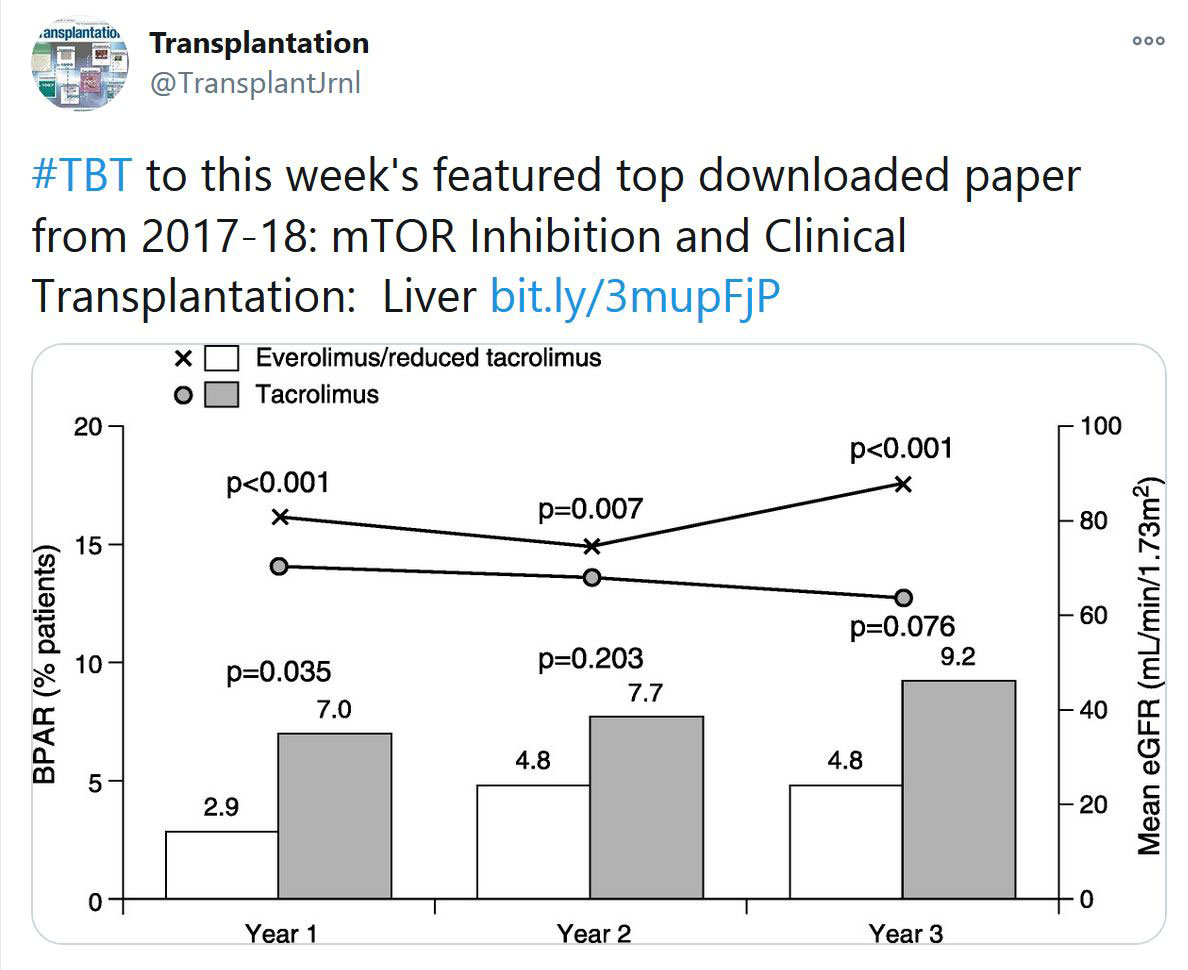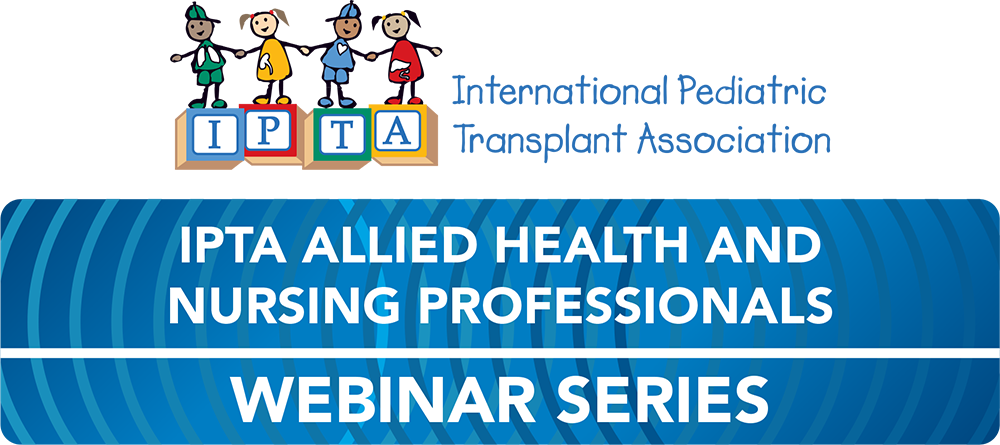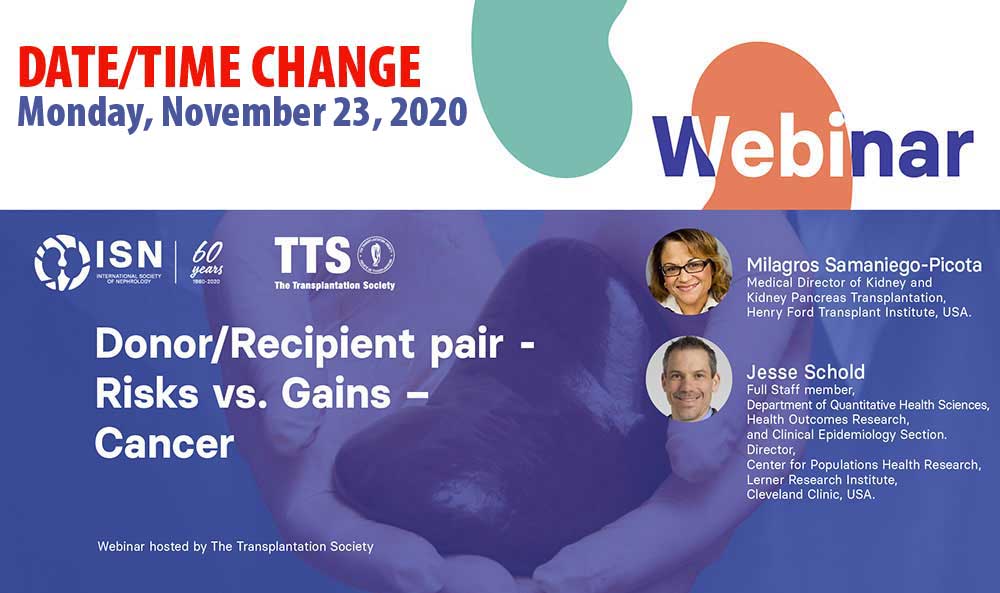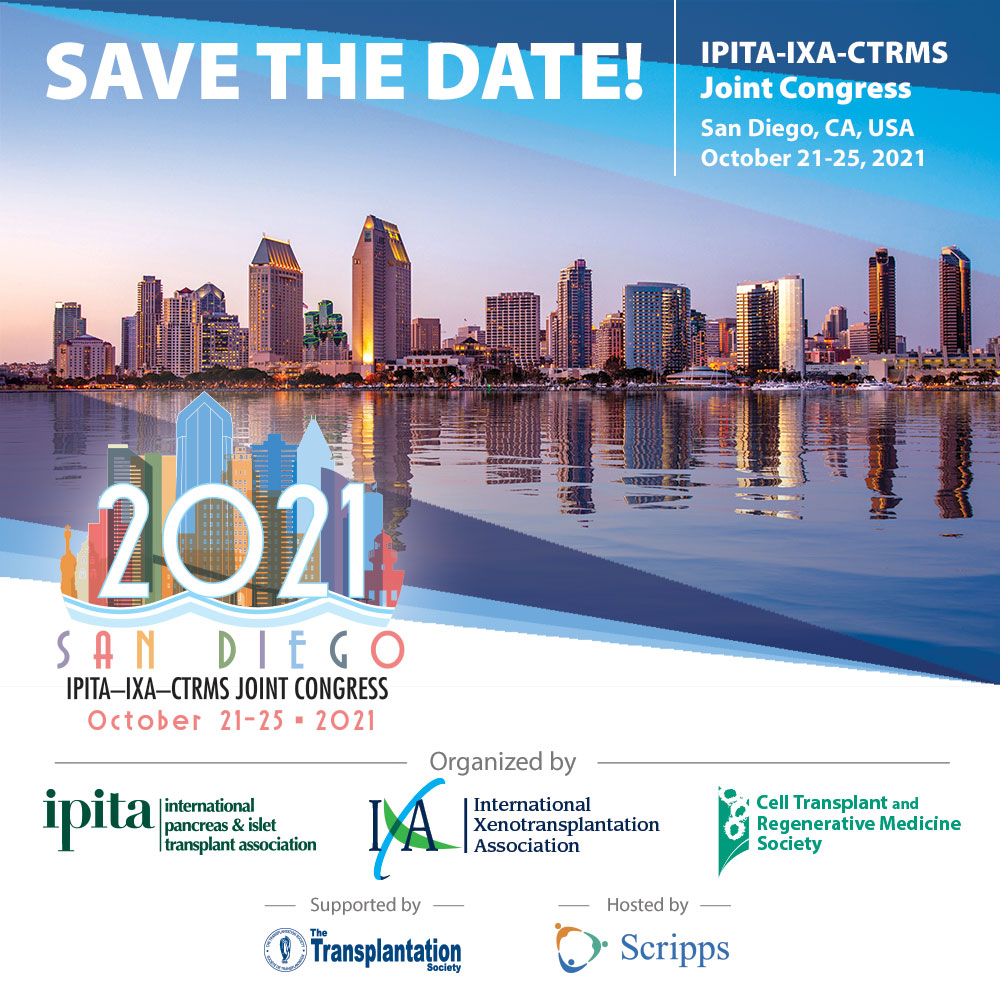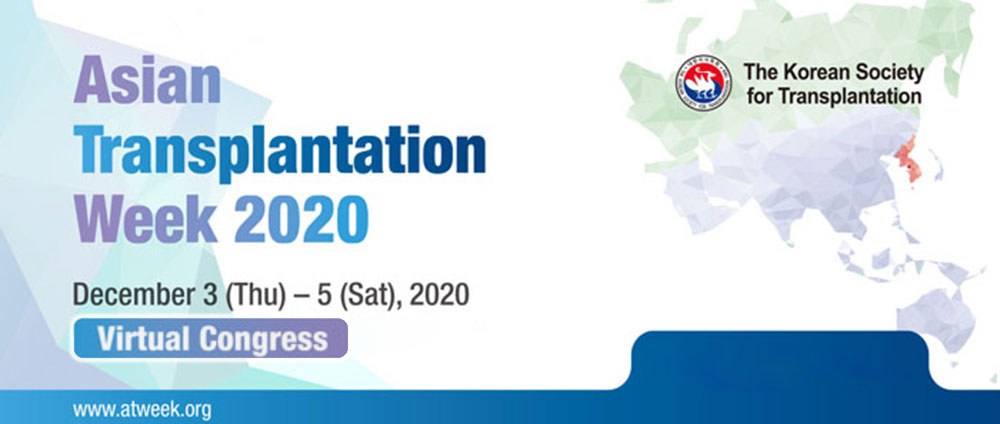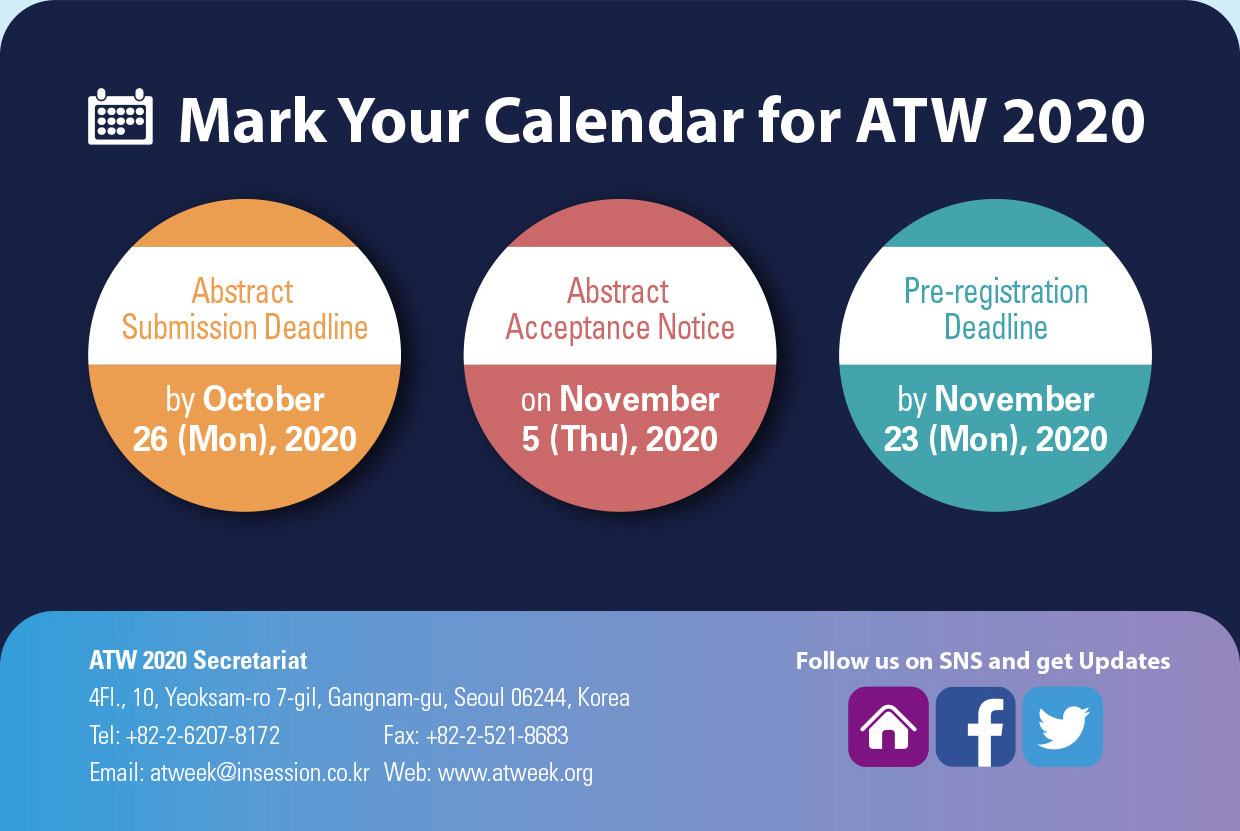

TRANSPLANTATION - HIGHLIGHTED ARTICLE
Dr. Jeremy R. Chapman, Editor-in-Chief, Transplantation
FOXP3 mRNA Profile Prognostic of Acute T-cell–mediated Rejection and Human Kidney Allograft Survival
Luan D, Dadhania DM, Ding R, et al.
Transplantation: October 7, 2020 - Volume Online First
Following a long tradition of analysis of urine from renal transplants this well-established group tested more than 3500 urine samples from 480 transplant recipients. The study examined the mRNA profile and T cell mediated rejection. 18S rRNA normalized levels of mRNA for FOXP3, CD25 and perforin were diagnostic of TCMR, but only FOXP3 mRNA level predicted the reversibility of TCMR after treatment. The study points to the utility of measuring urinary cell levels of FOXP3 mRNA for predicting prognosis of kidney allografts.
TRANSPLANTATION - WEEK'S MOST DOWNLOADED PAPER
TTS and TTS Sections News
TTS 2020

Young Member's Committee Chair, Shaifali Sandal interviewed Elmi Muller and Dorry Segev where she asked questions relevant to those new to the transplant community.
IPTA 2020 Call for Nominations
The IPTA Nominations Committee is seeking qualified candidates to be considered for open Councilor and Officer positions beginning in May 2021.
All applications will be reviewed by the IPTA Nominations Committee, who will present a final slate of candidate officers and councilors to the IPTA membership for the 2021 election.
The IPTA Nominations Committee welcomes nominations and applications from anyone who has been an IPTA member in good standing for at least 1 year. Service to IPTA on committees or special activities relevant to the society is an asset.
The deadline for online submission of applications is November 30, 2020.
Upcoming Webinars
IPTA ALLIED HEALTH AND NURSING PROFESSIONALS WEBINAR
TIPS AND TRICKS FOR VIRTUAL CARE IN PEDIATRIC TRANSPLANT
The COVID -19 pandemic has been a time of rapid and unprecedented change in the provision of clinical care. Both health care professionals and the transplant families we provide care for have had to adjust to this change at a monumental pace.
This session is meant to highlight some of the adaptations made by various members of our transplant allied health and nursing professional community whose practice has traditionally relied upon in-person assessment and intervention.
The session will have presentations from the following professionals from across the globe:
- Clinical Psychologists
- Physiotherapist
- Physician Assistant
- Child Life Specialist
Objectives:
- Develop a greater understanding of varying allied health and nursing clinical practice adaptations during the COVID-19 pandemic
- Review the learned pros and cons of virtual practice and adaptations made
- Discuss potential longer term practice changes that have evolved as a result of the pandemic
DATE/TIME CHANGE
ISN-TTS Webinar: Donor/Recipient pair - Risks vs. Gains - Cancer
«HOT OFF THE PRESS»
RECENT PUBLICATIONS IDENTIFIED BY TTS EDUCATION COMMITTEE ON COVID-19
SARS-CoV-2 Neutralizing Antibody LY-CoV555 in Outpatients with Covid-19
Peter Chen et al.
New England Journal of Medicine. October 28, 2020. DOI: 10.1056/NEJMoa2029849
In this ongoing phase 2 trial involving outpatients with recently diagnosed mild or moderate Covid-19, the authors randomly assigned 452 patients to receive a single intravenous infusion of neutralizing antibody LY-CoV555 in one of three doses (700 mg, 2800 mg, or 7000 mg) or placebo and evaluated the quantitative virologic end points and clinical outcomes. The primary outcome was the change from baseline in the viral load at day 11. At the time of the interim analysis, the observed mean decrease from baseline in the log viral load for the entire population was −3.81, for an elimination of more than 99.97% of viral RNA. For patients who received the 2800-mg dose of LY-CoV555, the difference from placebo in the decrease from baseline was −0.53 (95% confidence interval [CI], −0.98 to −0.08; P=0.02), for a viral load that was lower by a factor of 3.4. Smaller differences from placebo in the change from baseline were observed among the patients who received the 700-mg dose (−0.20; 95% CI, −0.66 to 0.25; P=0.38) or the 7000-mg dose (0.09; 95% CI, −0.37 to 0.55; P=0.70). On days 2 to 6, the patients who received LY-CoV555 had a slightly lower severity of symptoms than those who received placebo. The percentage of patients who had a Covid-19–related hospitalization or visit to an emergency department was 1.6% in the LY-CoV555 group and 6.3% in the placebo group.
Outcomes following SARS-CoV-2 infection in liver transplant recipients: an international registry study
Gwilym J Webb et al.
Lancet Gastroenterol Hepatol. 2020; 5: 1008–16
Between March 25 and June 26, 2020, data were collected for 151 adult liver transplant recipients from 18 countries (median age 60 years [IQR 47–66], 102 [68%] men, 49 [32%] women) and 627 patients who had not undergone liver transplantation (median age 73 years [44–84], 329 [52%] men, 298 [48%] women). ICU admission (43 [28%] vs 52 [8%] and invasive ventilation (30 [20%] vs 32 [5%], were more frequent in the liver transplant cohort. 28 (19%) patients in the liver transplant cohort died, compared with 167 (27%) in the comparison cohort. Liver transplantation did not significantly increase the risk of death in patients with SARS-CoV-2 infection. Multivariable logistic regression analysis showed that age (odds ratio 1·06 [95% CI 1·01 to 1·11] per 1 year increase), serum creatinine concentration (1·57 [1·05 to 2·36] per 1 mg/dL increase), and non-liver cancer (18·30 [1·96 to 170·75]) were associated with death among liver transplant recipients.
Convalescent plasma in the management of moderate covid-19 in adults in India: open label phase II multicentre randomised controlled trial (PLACID Trial)
Anup Agarwal et al.
BMJ 2020; 371 doi: https://doi.org/10.1136/bmj.m3939 (Published 22 October 2020)
464 adults (≥18 years) admitted to hospital (screened 22 April to 14 July 2020) with confirmed moderate covid-19 (partial pressure of oxygen in arterial blood/fraction of inspired oxygen (PaO2/FiO2) ratio between 200 mm Hg and 300 mm Hg or a respiratory rate of more than 24/min with oxygen saturation 93% or less on room air): 235 were assigned to convalescent plasma with best standard of care (intervention arm) and 229 to best standard of care only (control arm). Participants in the intervention arm received two doses of 200 mL convalescent plasma, transfused 24 hours apart. Progression to severe disease or all cause mortality at 28 days after enrolment occurred in 44 (19%) participants in the intervention arm and 41 (18%) in the control arm (risk difference 0.008 (95% confidence interval −0.062 to 0.078); risk ratio 1.04, 95% confidence interval 0.71 to 1.54). Convalescent plasma was not associated with a reduction in progression to severe covid-19 or all cause mortality.
CORONAVIRUS (COVID-19) UPDATES
INVITATION TO PARTICIPATE

Dear Members,
Researchers at McGill University are currently conducting a study entitled LIST-COVID-19 to study the impact of the COVID-19 pandemic on transplantation activity, volumes and immunosuppression practices on a global scale. The study will also help better understand the current and anticipated risks to transplantation during the pandemic and inform clinical practice during the “ramp-up” phase. The Transplantation Society is supporting the project, as well as several National and International Societies.
They are looking for physicians who take care of patients with a solid organ transplant to take a 10-15 minute survey on behalf of their center and program. Please note this is not a patient registry and no specific patient-level data is being collected. Please be assured they will only perform a collective analysis of the survey questions and no personal information identifying the participants will be divulged. The survey responses will be confidential. If you are interested in participating, please contact them at the emails listed below.
Investigators: Shaifali Sandal, MD and Marcelo Cantarovich, MD
Contact: shaifali.sandal@mcgill.ca and marcelo.cantarovich@muhc.mcgill.ca
The Transplantation Society (TTS) and our journal Transplantation have developed online resources to keep you informed on the Coronavirus (COVID-19) outbreak.
- TTS Coronavirus (COVID-19) Dashboard
www.tts.org/covid-19 - Transplantation Global Transplantation COVID Report
www.tts.org/txjcovid19
We are also requesting contributions and news from the transplant community to be sent to covid-19@tts.org for inclusion on our resources page.
In this dashboard, you will find links to TTS and other global and regional resources, as well as interactive maps, publications and webinars. We encourage you to explore this dashboard and share with your colleagues.
Editors and contributors to Transplantation have shared their thoughts on how they are dealing with the current crisis. While we understand that the information of today may be quite different tomorrow in this fast-moving pandemic, this report will open our forum of an international exchange on COVID for the transplant community.
Website - www.tts.org/txjcovid19
Please send your own contributions and news to covid-19@tts.org for inclusion on our resources page.
IN THE NEWS
Even radical reproductive surgery need not mean the end of fertility and motherhood
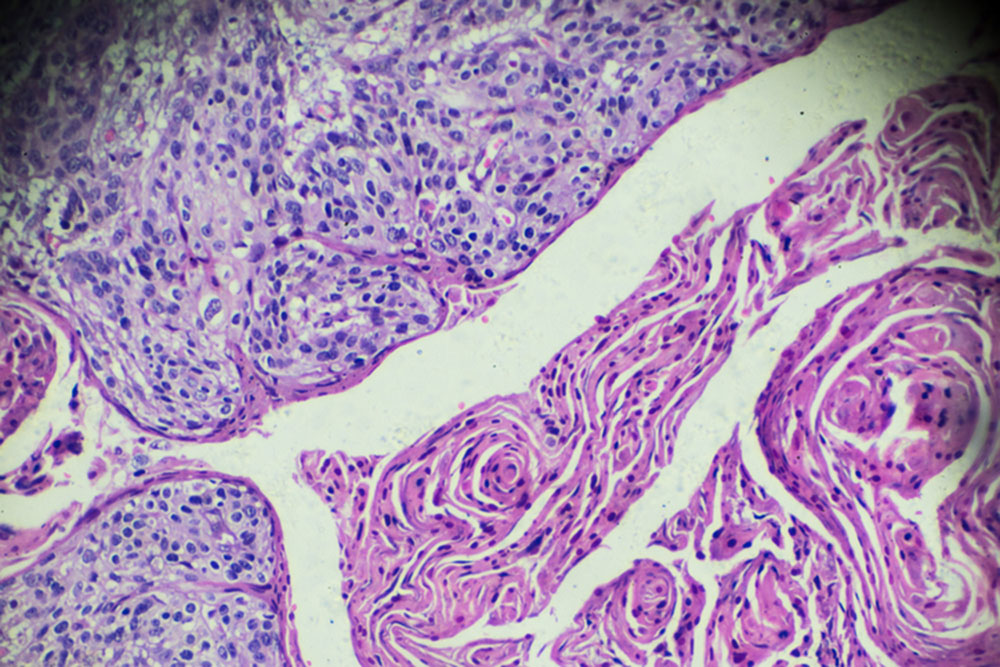
Oct. 27 - An online Campus meeting held in October considered the outcomes of uterine transplantation for fertility restoration and radical surgery to treat genital tract malformations. The conclusions were positive but cautious.
Immunotherapy After Transplant Does Not Raise Men’s Risk for Prostate Cancer, Study Finds
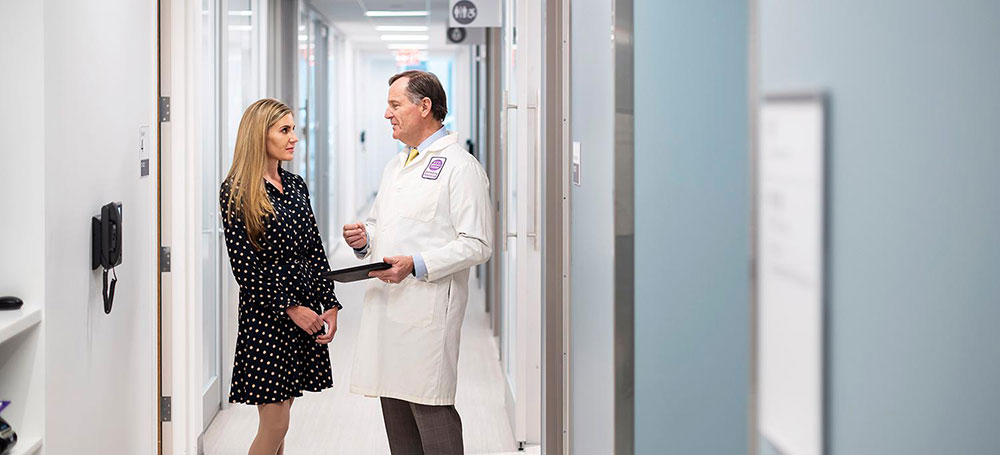
Oct. 29 - Rapid advancement in treatment and surgical techniques for solid organ transplant means many transplant recipients—about half of whom are over age 50—now live well past middle age. As a result, men who receive kidney, liver, and heart transplants are facing issues related to aging, including screening and treatment for prostate cancer. The potential impact of immunosuppression on tumor biology should always be considered in men who are candidates for or who have had a solid organ transplant.
Vitamin D levels in liver transplantation recipients and early postoperative outcomes: Prospective observational DLiverX study
Oct. 27 - Researchers aimed at reporting on the trend of vitamin D in orthotopic liver transplantation (OLT) recipients and its correlation with outcomes. In this prospective observational study of 67 consecutive OLT recipients, 64 (95.5%) recipients were vitamin D deficient (< 20 ng/ml), and 47 of these (70.1%) displayed severe deficiency (< 12 ng/ml) at baseline. This suggests the presence of vitamin D deficiency in the majority of liver transplantation recipients.
Specialty Camps Benefit Children with Solid Organ Transplant
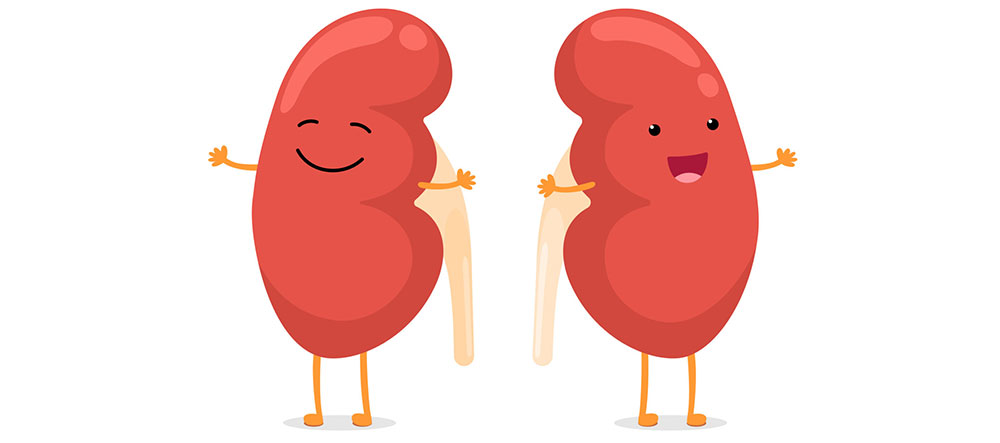
Oct. 29 - Children with end-stage organ failure require intensive management and education to enable allograft function and improve their quality of life. Children in that patient population are frequently behind their peers in many important areas. Sara Kennedy, BSN, RN, CNNe, and Cindy Richards, BSN, RN, CNN, created a camp for children with late-stage organ failure to enhance their emotional, physical, and psychological well-being.
Antifungal Prophylaxis Reduces Mortality in Lung Transplantation
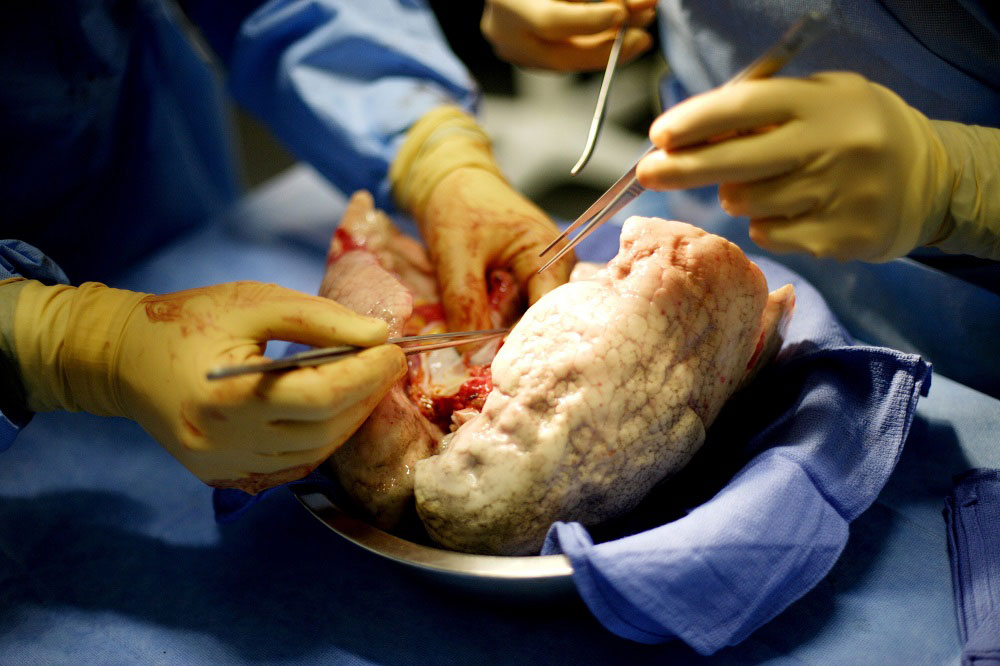
Oct. 30 - Lung transplant recipients who were given antifungal medications prophylactically to prevent invasive fungal infections had lower rates of mortality, according to the results of a recent study published in Annals of the American Thoracic Society.
UPCOMING MEETINGS AND ANNOUNCEMENTS
International Transplantation Science Meeting (ITS 2021)
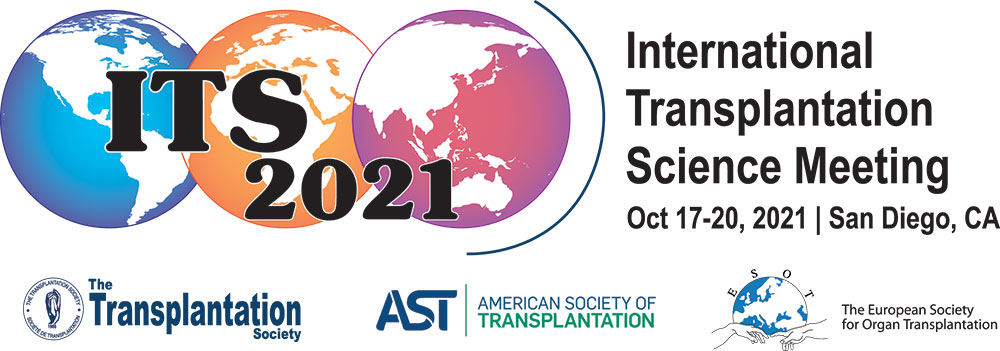
IPITA-IXA-CTRMS Joint Congress
Asian Transplantation Week (ATW) 2020
Contact
Address
The Transplantation Society
International Headquarters
740 Notre-Dame Ouest
Suite 1245
Montréal, QC, H3C 3X6
Canada
Используйте Вавада казино для игры с бонусом — активируйте промокод и начните выигрывать уже сегодня!

